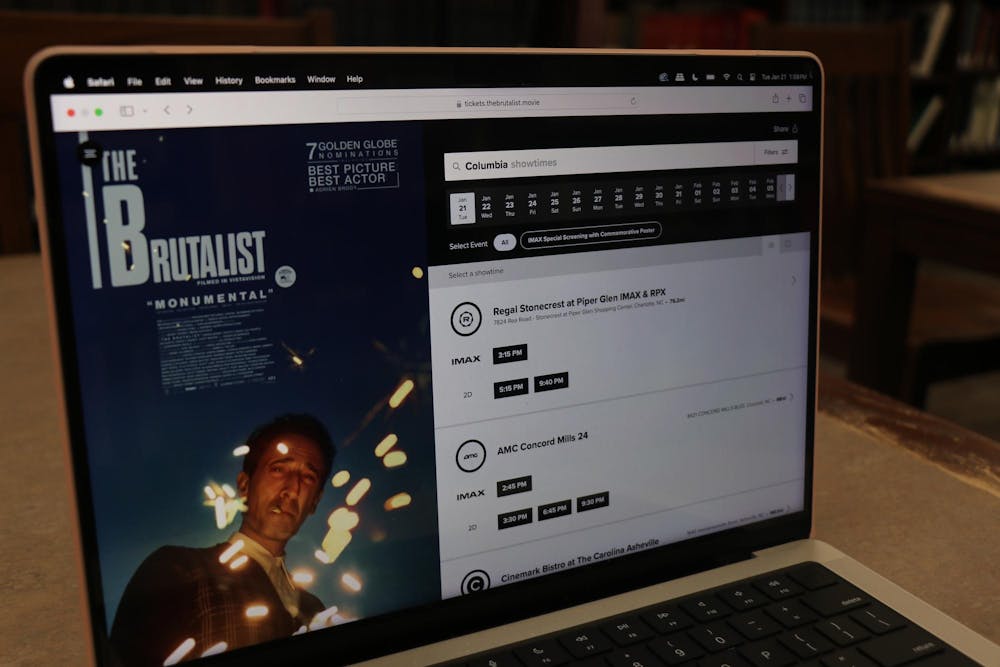Movie: The Brutalist
Release Date: Dec. 20, 2024
Director: Brady Corbet
Runtime: 3 hours, 35 minutes
Genre: Drama
Oscar Nominations: Picture, Director, Actor, Supporting Actress, Supporting Actor, Original Screenplay, Cinematography, Editing, Production Design and Original Score
Rating: A

Each year, a handful of critically acclaimed films come along with overused phrases such as “they don’t make them like this anymore” attached to them. Many films do not live up to the colossal expectations placed upon audiences because of these hyperbolic statements. Channeling American epics of old, such as “Once Upon a Time in America,” Brady Corbet has delivered a towering achievement that lives up to those hyperboles with “The Brutalist.”
The story spans 30 years in the life of visionary architect László Tóth (Adrien Brody), who immigrated to the United States in 1947 after fleeing post-World War II Hungary in search of a better life. Upon arrival in America, László joins his cousin Attila (Alessandro Nivola) at his home in Pennsylvania. Once Attila tells László that his wife, Erzsébet (Felicity Jones), is alive, he begins working in order to help his wife immigrate to America.
László starts working for wealthy industrialist Harrison Lee Van Buren (Guy Pearce). Through the relationship between László and Van Buren, Corbet explores the depths to which wealthy patrons will go in order to control not only an artist's work but the artist themselves.
The contrast between the two is sharp. László is an artist full of talent and creativity who adds extraordinary beauty to the world, whereas Van Buren lacks this creativity despite his immense wealth. Because of his envy of László's creativity, Van Buren tries to possess László, both literally and figuratively. This exploitation of László and his art is where Corbet draws a parallel to how America exploits its immigrants.
The film then takes a 15-minute intermission. Up to this point, it has explored complex themes about wealthy capitalists exploiting immigrants in search of the American dream, and it has been fairly easy to digest. It should come as no surprise to those who are familiar with Corbet’s past work that “The Brutalist” takes some challenging and unexpected turns in the second half.
After the intermission, László’s wife, Erzsébet, arrives from Hungary. From here, the film becomes more personal and, in turn, more brutal for László. Suffering emotional and physical abuse at the hands of Van Buren, László begins to spiral out of control. If the first half of the film was a careful examination of the American dream, the second half is a complete destruction of its shortcomings.
A primary reason why “The Brutalist” affects so many people in its portrayal of the immigrant experience is because of the performances of the entire cast. Guy Pearce creates a cold and callous character in Van Buren, commanding everyone’s attention as he bursts onto the screen without care for the thoughts or safety of those who work for him. While Felicity Jones does not appear until the second half, she makes the most of her screen time, stealing multiple scenes with raw emotion on full display, specifically the explosive climax wherein she confronts Van Buren.
Adrien Brody's performance makes the film as extraordinary as it is. In a career that includes an Oscar-winning performance for his portrayal of Władysław Szpilman in "The Pianist," nothing compares to what he accomplished in this film. Brody exudes his entire soul into the character of László, capturing a wide range of emotions that the audience can see without him needing to speak a word. Brody's towering performance in “The Brutalist” will go down not only as the best of the year but as one of the finest of the 21st century because of his ability to make audiences feel every emotion of his character,
Corbet’s ability to craft this monumental film, which is as weighty in its subject matter as it is in its 215-minute runtime, is one of the most significant cinematic achievements in recent memory. Telling such a sprawling epic on the largest of scales with a budget of only $10 million is unheard of in the modern age. With this film, Corbet has cemented himself as one of cinema's most important and unique voices, commanding respect with each creative swing he takes.
While “The Brutalist” may be too challenging for some, it is without a doubt that if there is any film from this year that will be studied for decades to come, whether it be for the storytelling, acting or direction, it is this one.

